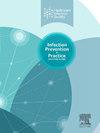Assessment of knowledge, attitude and practices regarding standard precautions of infection prevention and control and associated factors among healthcare personnel working at tertiary care hospitals in Punjab, Pakistan
IF 1.9
Q3 INFECTIOUS DISEASES
引用次数: 0
Abstract
Background
Inadequate infection control in healthcare settings can increase healthcare-associated infections and worsen morbidity and mortality rates. Standard precautions, applicable to all patients with suspected or confirmed infections, safeguard both healthcare personnel and patients. This study aimed to evaluate knowledge, attitudes and practices regarding standard precautions among healthcare personnel in tertiary care hospitals across Punjab, Pakistan.
Methods
This multi-centre cross-sectional study, conducted from May to July 2019, included 600 healthcare personnel recruited via convenience sampling from tertiary care hospitals in six cities selected at random.
Results
Out of 533 healthcare personnel, the response rate was 88.8%. Most respondents were female (N=341, 64.2%), mean ± standard deviation (SD) age was 28.85 ±7.08 years, and mean ± SD length of service was 5.58 ± 5.78 years. Knowledge, attitudes and practices regarding standard precautions were poor, and only 37.5%, 46.7% and 46.3% of respondents had good knowledge, positive attitudes and safe practices, respectively. Healthcare personnel with >10 years of experience [adjusted odds ratio (AOR) 2.98, 95% confidence interval (CI) 1.60–5.55], previous infection control training (AOR 1.96, 95% CI 1.30–2.94), professional degrees (AOR 2.04, 95% CI 1.16–3.60), and availability of infection control guidelines in their work department were more likely to have good knowledge regarding standard precautions. The availability of infection control guidelines in the work department was also significantly associated with positive attitudes (AOR 2.83, 95% CI 1.76–4.56) and safe practices (AOR 3.46, 95% CI 1.94–6.14).
Conclusion
Knowledge, attitudes and practices of healthcare personnel regarding standard precautions were inadequate. Continuous education and certified training for healthcare personnel can improve infection control measures substantially in public healthcare settings.
评估巴基斯坦旁遮普省三级保健医院医护人员关于感染预防和控制标准预防措施及相关因素的知识、态度和做法
背景:在卫生保健机构中,适当的感染控制可增加卫生保健相关感染,并使发病率和死亡率恶化。适用于所有疑似或确诊感染患者的标准预防措施可保护医护人员和患者。本研究旨在评估巴基斯坦旁遮普省三级医院医护人员关于标准预防措施的知识、态度和做法。方法本多中心横断面研究于2019年5月至7月进行,随机抽取6个城市三级医院的600名医护人员进行方便抽样。结果533名医护人员中,应答率为88.8%。女性居多(N=341, 64.2%),平均±标准差(SD)年龄为28.85±7.08岁,平均±SD工龄为5.58±5.78岁。受访者对标准预防措施的了解、态度和做法较差,分别只有37.5%、46.7%和46.3%的受访者对标准预防措施有良好的了解、积极的态度和安全的做法。具有10年经验的卫生保健人员[调整优势比(AOR) 2.98, 95%可信区间(CI) 1.60-5.55]、既往感染控制培训(AOR 1.96, 95% CI 1.30-2.94)、专业学位(AOR 2.04, 95% CI 1.16-3.60)以及其工作部门感染控制指南的可获得性更可能对标准预防措施有良好的了解。工作部门感染控制指南的可获得性也与积极态度(AOR 2.83, 95% CI 1.76-4.56)和安全操作(AOR 3.46, 95% CI 1.94-6.14)显著相关。结论卫生保健人员对标准预防措施的知识、态度和实践不足。对卫生保健人员的持续教育和认证培训可以大大改善公共卫生保健机构的感染控制措施。
本文章由计算机程序翻译,如有差异,请以英文原文为准。
求助全文
约1分钟内获得全文
求助全文
来源期刊

Infection Prevention in Practice
Medicine-Public Health, Environmental and Occupational Health
CiteScore
4.80
自引率
0.00%
发文量
58
审稿时长
61 days
 求助内容:
求助内容: 应助结果提醒方式:
应助结果提醒方式:


